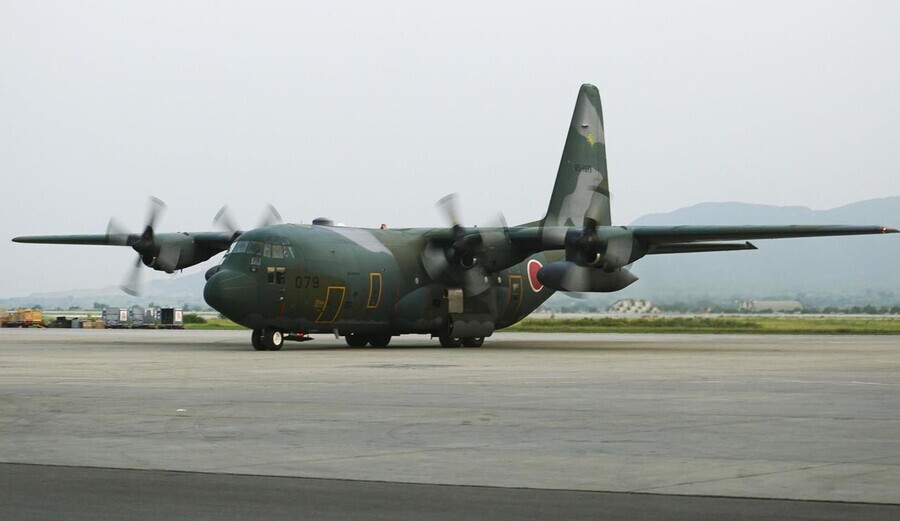hankyoreh
Links to other country sites 다른 나라 사이트 링크
Japan’s Afghanistan evacuation fails without airlifting any Afghans

The Japanese government sent its Japan Self-Defense Forces (JSDF) to Afghanistan to evacuate around 500 employees remaining behind there but ended up deciding to withdraw without achieving any result.
Even within Japan's ruling Liberal Democratic Party (LDP), critics denounced the administration for its belated response. Many are now demanding thorough scrutiny to determine what went wrong.
On Tuesday, the Asahi Shimbun newspaper and other news outlets reported that the Japanese government planned to withdraw the JSDF from Afghanistan by as early as Wednesday following the withdrawal of US troops stationed there, with a meeting of the National Security Council to be held shortly to decide on a concrete approach.
The Japanese government sent three transport aircraft, one government aircraft, and around 300 JSDF members to evacuate roughly 500 people, including Afghan employees of the local Japanese embassy and the Japan International Cooperation Agency and their family members, but only succeeded in evacuating one Japanese national.
Critics assailed the operation as a "perfect failure" — an incomprehensible outcome in view of Japan's diplomatic standing.
"The dispatching of JSDF for an escape from Afghanistan has ended in failure," the Yomiuri Shimbun newspaper said Tuesday.
"Even within the ruling party, there have been criticisms of the government's slow-footed response," it noted.
The newspaper went on to lay out the problems with the Japanese response point by point, comparing it with South Korea's evacuation of 390 Afghan nationals.
It had previously been reported that the decisive factor in the two differing outcomes lay with the buses used to transport potential evacuees to the Kabul airport.
Japan prepared evacuation buses on Thursday, a day later than South Korea, but that plan ended up frustrated due to suicide bombing attacks near the airport that evening by the group Islamic State Khorasan Province.
"While South Korean embassy staff returned to Kabul and took action directly to prepare buses, Japanese embassy staff responded remotely [via telephone and online] from outside of Afghanistan," the newspaper said.
A Japanese Ministry of Defense official told the newspaper, "The fact that there weren't any embassy staff well acquainted with the local situation may have had an influence."
Another factor appears to have been the inadequate response by the Prime Minister's Official Residence (Kantei), which has been acting as a control tower.
Noting that the Kantei includes the "National Security Secretariat as a control tower for foreign affairs and national security" and the "Cabinet Secretariat's situation response and crisis management officer in charge of crisis management," the newspaper remarked that the response was "almost entirely delegated to the Ministries of Foreign Affairs and Defense."
In an editorial Tuesday, the Asahi Shimun stressed, "It is extremely regrettable that the JSDF was withdrawn while the Afghan people were left behind, and the government should recognize the seriousness of this."
The newspaper also called for thorough scrutiny, noting that the government has "shared almost no information about the circumstances to date."
"We must thoroughly examine the circumstances in terms of whether the decision to send in [the JSDF and others] came too late, whether there was any way to support the transportation to the airport, and how all Japanese embassy employees were able to leave Afghanistan," it said.
By Kim So-youn, Tokyo correspondent
Please direct comments or questions to [english@hani.co.kr]

Editorial・opinion
![[Editorial] Penalties for airing allegations against Korea’s first lady endanger free press [Editorial] Penalties for airing allegations against Korea’s first lady endanger free press](https://flexible.img.hani.co.kr/flexible/normal/500/300/imgdb/original/2024/0502/1817146398095106.jpg) [Editorial] Penalties for airing allegations against Korea’s first lady endanger free press
[Editorial] Penalties for airing allegations against Korea’s first lady endanger free press![[Editorial] Yoon must halt procurement of SM-3 interceptor missiles [Editorial] Yoon must halt procurement of SM-3 interceptor missiles](https://flexible.img.hani.co.kr/flexible/normal/500/300/imgdb/child/2024/0501/17145495551605_1717145495195344.jpg) [Editorial] Yoon must halt procurement of SM-3 interceptor missiles
[Editorial] Yoon must halt procurement of SM-3 interceptor missiles- [Guest essay] Maybe Korea’s rapid population decline is an opportunity, not a crisis
- [Column] Can Yoon steer diplomacy with Russia, China back on track?
- [Column] Season 2 of special prosecutor probe may be coming to Korea soon
- [Column] Park Geun-hye déjà vu in Yoon Suk-yeol
- [Editorial] New weight of N. Korea’s nuclear threats makes dialogue all the more urgent
- [Guest essay] The real reason Korea’s new right wants to dub Rhee a founding father
- [Column] ‘Choson’: Is it time we start referring to N. Korea in its own terms?
- [Editorial] Japan’s rewriting of history with Korea has gone too far
Most viewed articles
- 160% of young Koreans see no need to have kids after marriage
- 2Months and months of overdue wages are pushing migrant workers in Korea into debt
- 3[Editorial] Penalties for airing allegations against Korea’s first lady endanger free press
- 4[Guest essay] Maybe Korea’s rapid population decline is an opportunity, not a crisis
- 51 in 3 S. Korean security experts support nuclear armament, CSIS finds
- 6[Reporter’s notebook] In Min’s world, she’s the artist — and NewJeans is her art
- 7Bills for Itaewon crush inquiry, special counsel probe into Marine’s death pass National Assembly
- 8S. Korea discusses participation in defense development with AUKUS alliance
- 9Japan’s standards for use of preemptive counterstrike against N. Korea remain unclear
- 10Trump asks why US would defend Korea, hints at hiking Seoul’s defense cost burden